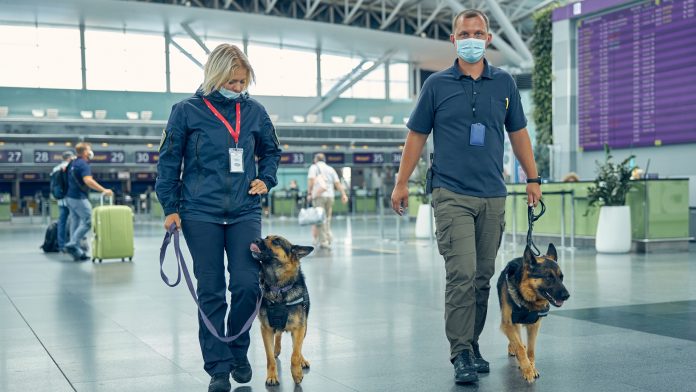
Trained sniffer dogs can accurately identify airport passengers with SARS-CoV-2 infection, potentially opening opportunities for COVID-19 detection.
As the summer holiday season approaches, new research confirms that trained sniffer dogs can accurately detect airport passengers with SARS-CoV-2 infection. Evidence indicates that trained sniffer dogs can detect distinct volatile organic compounds released during various metabolic processes in the body, including those generated by bacterial, viral and parasitic infections.
Preliminary data suggest that dogs can be trained within weeks to detect samples from patients with a SARS-CoV-2 infection; with comparable accuracy to the standard PCR nose and throat test.
The research is in the open-access journal BMJ Global Health.
Can dogs detect SARS-CoV-2?
Four trained sniffer dogs were designated four skin swab samples from 420 volunteers. The dogs sniffed samples from 114 volunteers who had a SARS-CoV-2 infection and from 306 who tested negative. Random samples were given to each dog over seven trial sessions.
The diagnostic accuracy of all samples sniffed was 92%. The accuracy of detecting those with a SARS-CoV-2 infection was 92%; the accuracy of detecting those without infection was 91%.
Minor variation was observed within the four dogs. The best performance reached 93% for sensitivity and 95% for specificity; the worst reached 88% for sensitivity and 90% for specificity.
The four dogs were then re-located to Helsinki-Vantaa International Airport in Finland, where they sniffed 303 incoming passengers between September 2020 and April 2021. Each passenger also took a PCR swab test. The dogs correctly identified the negative samples in 296 out of 300 (99%) PCR negative swab tests and identified three PCR positive cases as negative. After re-evaluation with clinical and serological data, one was SARS-CoV-2 negative, one SARS-CoV-2 positive, and one a likely post-infectious positive PCR test result.
As SARS-CoV-2 infection rates were relatively low in the airport, 155 samples from people who tested positive were given to the dogs. The dogs accurately identified just under 99% of them as positive.
While promising, these lab data results need to be replicated in real-life conditions.
Accurately detecting all relevant variants
The researchers acknowledge that dogs trained to sniff out other substances may mistakenly identify these substances as SARS-CoV-2 positive. The required storage period of the training and spiked samples may also have affected the viability of the volatile organic compounds.
A key finding was that the dogs were less successful at correctly identifying the alpha variant as they had been trained to detect the wild type. But this highlights how good dogs are at distinguishing between different scents, said the researchers.
“This observation is remarkable as it proves the scent dogs’ robust discriminatory power. The obvious implication is that training samples should cover all epidemiologically relevant variants. Our preliminary observations suggest that dogs primed with one virus type can in a few hours be retrained to detect its variants.”










